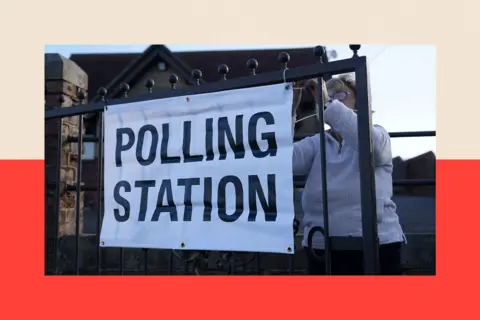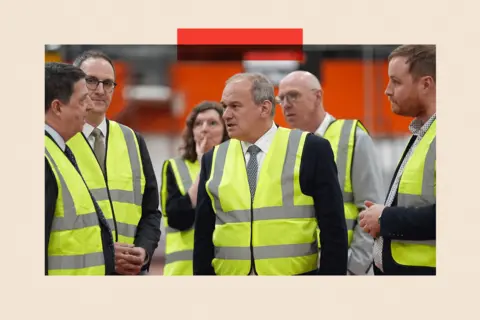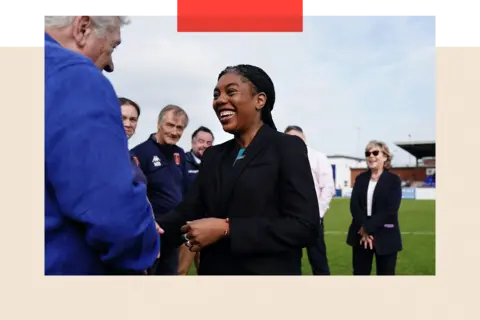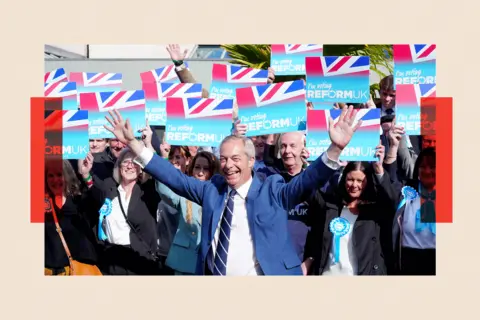

Laura Kuenssberg
Presenter, Sunday with Laura Kuenssberg•@bbclaurak

 BBC
BBC
“A sliver here and a sliver there” – in a few days millions of voters will be taking part in what are, frankly, a pretty weird set of elections.
Forget the huge thwack of decisive national victory. Brace for what one former minister described as slivers of votes between five political parties, determining who wins and loses power over town halls in England, and one perch in the Commons.
The results will set the political pace for the next few months. And from Friday, Reform could give the two big traditional tribes a problem, and also acquire a potential problem they haven’t encountered thus far – a track record to defend.
The largest parties are both likely to have a horrible time of it. Labour’s wide coalition of voters went pop almost as soon as they moved into No 10.
Calm heads in government say it was always going to be thus because of the state of the country when they took over. Sir Keir Starmer even told us on the record he was going to “have to be unpopular” – a curious ambition for a politician!
But more candid insiders admit the government “looked very unsure” at the start. “They didn’t come in with a big project,” one source says, and many voters took a dim view of ministers’ freebies and the decision on winter fuel allowance.
Labour loyalists and spin doctors will emphasise what is true – the elections being fought at council level are “us fighting in the shires”, as one of them said.
A poor performance in areas that are traditionally Tory, where the party prospered in 2021, won’t be a surprise. One cabinet minister says, “they’re just not our heartlands, so we just haven’t got our normal base”.
But Labour could also lose mayors and there’s no such excuse in what was one of their safest seats, in Runcorn, in the by-election where they could struggle to cling on.
After 10 months in power, next week could show Labour how much the reality of government can really hurt.

 Getty Images
Getty Images
The Conservatives have also been falling over themselves to tell you just saying how awful it’s going to be for them after they were, in the words of one senior figure, “absolutely, mercilessly hammered” back in July.
The leadership says “nowhere is safe”. Some sources even warn in private they could lose all of the town halls they control.
The concern behind the very public worry about losing hundreds and hundreds of seats is that “we might not yet actually have hit the bottom”, in the words of another veteran.
Leader Kemi Badenoch’s backers continually say that rebuilding the party is a long-term project, and praise her for managing to draw at least a faint line under the toxic infighting that corroded Conservative ranks in recent years.
The broad sense in Westminster is that dreadful results next week won’t usher Badenoch to the door. Still, you’d be hard pressed to find a Conservative who’d happily bet their mortgage she’ll definitely be in charge by the time of the next election.
That’s in large part because in the words of one Tory bigwig, “she was working on the basis that it was her versus Starmer but it’s not her versus Starmer, it’s her versus Starmer and Farage and Davey”.

 PA Media
PA Media
This election is pick and mix, with the newest morsels on offer coming from Nigel Farage’s Reform UK. They see success in these elections as “two or three more steps up the staircase” towards power, says a senior figure.
The other parties report Reform spending big, particularly on online advertising, focusing on national issues like immigration and net zero, and “putting Farage out to draw a crowd”, according to a minister.
Reform sources scent success. They hope they can nab Runcorn from Labour (although they aren’t banking on it), but are more confident of winning mayoral races and of taking plenty of council seats.
But anything less than big wins will undermine their exuberant claim that it’s credible to see Farage in No 10 one day – and possibly, for that matter, give pollsters red faces again.


Sign up for the Off Air with Laura K newsletter to get Laura Kuenssberg’s expert insight and insider stories every week, emailed directly to you.


Reform might be the loudest group, but they’re not the only one making life hard for the big boys. The Lib Dems reckon with a good night they might control more councils than the Tories this time next week – whether it’s Oxfordshire or Wiltshire, Buckinghamshire or other parts of the South West.
Leader Sir Ed Davey’s been back in his happy place – carrying out ever more ridiculous stunts on the campaign trail, meeting hedgehogs, and even waving around packets of British pork chops on TikTok this time, (I’m not making that up).
After July last year, the Lib Dems have a taste for making the Tories miserable, not just for the sake of it, but in the hope of taking out another chunk of their party’s traditional infrastructure, in the shape of their county councillors.
And party sources suggest their activists are more motivated, and their numbers even increasing, because of US President Donald Trump.

 PA Media
PA Media
Lastly, but not least, the Greens want to continue their steady march into council seats across England.
In 2023 they had their best showing in 20 years and took majority control of a council for the first time, adding many more councillors to their number last year.
This time round they want to add to the tally in counties like Shropshire, Gloucestershire and Kent, where they already have bums on seats.
The Green MPs have made less noise than their other newbie rivals at the other end of the spectrum, Reform. So at a time when enthusiasm for the climate agenda has been fading, or at least evolving in both the big main parties, next week the Green Party will want to show it is a growing force.
Any election is also a test of our political parties’ campaign machines – the questions different for each this time round.
For Labour, is it firing on all cylinders after its July triumph? Frankly, it doesn’t seem to be running a campaign at full throttle this time, which given the geography of the contests, shouldn’t surprise.
For the Conservatives, how much of its once legendary campaigning muscle is left after getting whacked in the summer? Some loyalists are heartened there are still members willing to knock on doors. But a rival campaigner now calls them the “tumbleweed Tories”, claiming they’re nowhere to be seen on the ground.
Both the Lib Dems and the Greens have long been playing effective local ground games, concentrating on building power bases in pockets of the country.
The most acute test perhaps then is for Reform, who have proven time and time again they can make a lot of noise nationally, on air, and increasingly, online.

 PA Media
PA Media
In five-party politics, many races may be won with a relatively small share of the vote, by tiny margins, that “sliver here and sliver there”.
These elections are likely to result in real-life evidence of a political idea that’s all the rage, that there’s “fragmentation” among the public, the traditional voting blocs are no more. Excitable columns are already being penned in anticipation, proclaiming that two-party politics is dead.
The splitting of the vote among so many groups also seems likely to leave more councils without any a clear majority.
In that case, they go into what’s known as “no overall control”, so the biggest party needs votes from the others to get their way.
It’s likely that will pose the Conservatives with a tricky real-life question after many weeks of troublesome hypothetical arguments: will they, or won’t they, work with their arch rivals Reform UK on the ground?
Crucially, if Reform makes its expected big advances, it will for the first time have responsibility for decisions that affect people’s lives. That will be a big achievement.
Both senior Labour and Conservative sources agree privately, as one said, “the biggest thing to come out of Thursday night is that Reform will have a record to defend”.
Next week the smaller parties are on track to have plenty to celebrate. If the General Election was branded the “ABC election – Anyone But the Conservatives”, maybe next week’s ballots will be branded the “ABB election – Anyone But the Big parties”.
BBC InDepth is the home on the website and app for the best analysis, with fresh perspectives that challenge assumptions and deep reporting on the biggest issues of the day. And we showcase thought-provoking content from across BBC Sounds and iPlayer too. You can send us your feedback on the InDepth section by clicking on the button below.







